How Joycelyn Wilson uses Kendrick Lamar to teach STEM at Georgia Tech

In Starz’s five-part docuseries about Magic City, Joycelyn Wilson appears frequently, providing historical context and analysis about Atlanta and the strip club’s impact. Her interview is situated amid a bevy of rappers and dancers from the club.
Wilson is no stranger to being the sole academic in the room. Throughout her career, she’s worked as a journalist, cultural scholar, hip-hop expert and math teacher. She’s written for XXL magazine, appeared in documentary productions such as AJC Studios’ “The South Got Something to Say,” and taught algebra to high school students in both California and Georgia.
Her current role is associate professor at Georgia Tech, focusing on educational anthropology within the Institute’s school of literature, media and communication. It is the combination of all of her work over nearly three decades.
“Hip-hop, (or) really just music in general, becomes the catalyst for enhancing our capacities, whether it’s creative, whether it’s computational, whether it’s leadership. It has the ability to do all of that,” she said.

As a college professor, Wilson has brought recording artists like Kid Cudi, T.I. and DJ Drama to her classes, using their lyrics to help students analyze the world around them.
The Atlanta professor isn’t the first to use pop culture to teach students about society. A Harvard University course on Taylor Swift’s catalog attempts to teach students “how to think about white texts, Southern texts, transatlantic texts, and queer subtexts.”
Meanwhile, an African American studies professor at Yale University offers students a chance to use Beyoncé’s music “as a lens to study Black history, intellectual thought and performance.”
Over the summer, Wilson taught a course titled “The Kendrick Lamar Lesson,” where she invited students to explore social issues through the lens of the Los Angeles rapper. Wilson said she used Lamar’s star power to engage students who might otherwise be distracted during hourslong virtual summer classes.
“We are talking about Kendrick for three hours, and they are locked in,” she said, noting that students record classes with their phones and eagerly participate in course discussions.
She hopes the rapper will one day visit the class. “To me, it can happen,” she said. “I’ve done it before. And I can do it again.”

Wilson studied math as an undergraduate student at the University of Georgia and eventually returned to the school to receive a Ph.D in educational anthropology. “I was just studying culture from an educational perspective. It was giving me the tools to really investigate who this generation (is), what it says about education, what it says about schooling, and then how you use it,” she said.
“I wanted to change curriculum. I wanted to change the way in which people learn. I think that music is perhaps the most robust space for teaching and learning. It’s one of the greatest tools.”
The link between STEM and music, specifically hip-hop, might not be immediately apparent to many people. But Wilson credits her upbringing in southwest Atlanta with helping her realize ways in which the two coexist.
“I went to a school that connected them: Mays (High School),” she said. “We had to learn how to write, and we had to learn how to compute.”
A native of Tuscaloosa, Alabama, Wilson’s family began relocating to Atlanta in the 1970s. Her uncles and aunts moved first, inspired by the ways in which then-Mayor Maynard Jackson promoted the city as a safe haven and land of opportunity for Black people.
“I have memories of coming to Atlanta as early as 5 years old,” Wilson recalled. “I just remember being around all Black people, and I thought that was cool, even as a kid.”

At first, she spent holidays and summers in Atlanta. By 1981, she moved with her mother and older sister, completing her fifth grade year at Peyton Forest Elementary School.
Wilson loved Atlanta. Ambassador Andrew Young had become mayor, and his son attended school with her. Wilson recalls seeing Young in the school hallway and running into the late Congressman John Lewis at the grocery store.
“There were these moments growing up where we realized we were very privileged, very insulated, and were a part of, I believe, an intentional experiment on what it would look like for a generation to be raised on everything Black,” Wilson said.
This included arts and entertainment. Wilson wasn’t aware of the city’s history with soul and funk, but she grew up watching her peers participate in local talent shows, just as hip-hop was taking off as a genre. Pioneering rap groups like Whodini and The Fat Boys visited her schools, she said.
Wilson learned the importance of education at a young age through examples set by family members. Her mother is a former social studies teacher who retired from Atlanta Public Schools, and she has aunts who have owned daycares in Atlanta since the late 1970s.
In 1996, after graduating from UGA, Wilson relocated to California and began working as a tutor for students in Manhattan Beach. She also tutored Ray J, the singer and younger brother of Brandy, while working for an agency aimed at homeschooled kids.
Eventually, Wilson taught algebra and geometry within the Manhattan Beach school district. That’s when she began incorporating hip-hop and culture into her classroom to engage students.

In 1999, she moved back to Atlanta to teach math at The Lovett School. She also found freelance work as a reporter covering Atlanta’s expanding rap scene, profiling rappers like T.I. and Jeezy early in their careers for publications such as The Source and XXL.
Wilson’s next project will lean on her writing chops, albeit with a different subject matter.
She’s preparing to release a book, “Hip-Hop and Design Remix Logic,” through UGA Press in 2026. The book won’t have her covering hip-hop, but instead interrogating how the culture works.
“A lot of the scholarship on hip-hop is about what it is, right? We know it’s an art form, we know it’s a culture. We know these different things about it, but there’s a dearth of scholarship on how it works. Like, what’s in it? Why does hip-hop remix the design of anything that it touches? (My book) is a way of describing that process,” she said, noting that she’ll use mathematical reasoning to do so.
Wilson said while she enjoys teaching “The Kendrick Lamar Lesson” and other courses in classrooms, she also remains committed to educating the general public via appearances in projects such as “Magic City.”
“I’m just grateful that I’m in a position where I’m still leading the charge and being really innovative in that space, and to do it at a place like Georgia Tech, that honors my math background as well as my creative and writing background.”
Become a member of UATL for more stories like this in our free newsletter and other membership benefits.
Follow UATL on Facebook, on X, TikTok and Instagram.